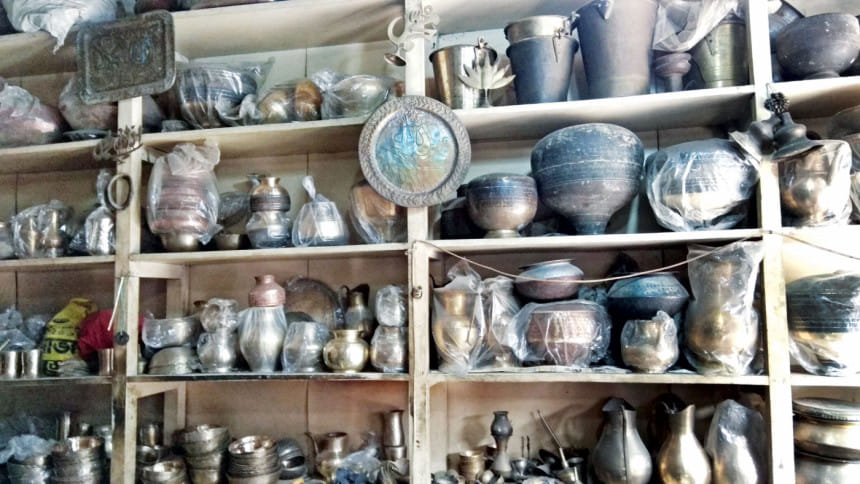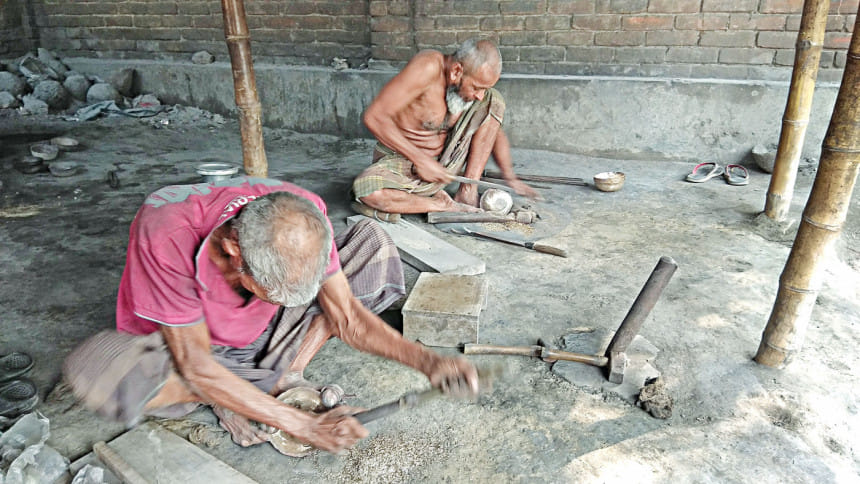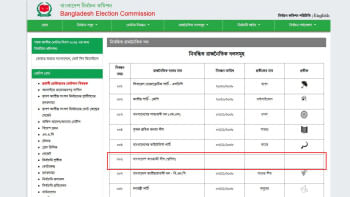Pewter holds bright prospects

The once tell-tale sounds of foundries bringing household utensils into shape out of pewter, brass and copper are increasingly making a comeback in Chapainawabganj.
Some five years back the advent of cheaper alternatives such as aluminium, plastic, ceramic, melamine and steel alongside price hikes of raw materials had led to dwindling of demand and use of the heavier alloys.
But afterwards, people have slowly realised the worth of such metal items, not just for their aesthetics but for the fact that their value stays nearly the same during resale and that they can be repaired to their original state.
Pewter, comprising about 91 per cent tin, 7.5 per cent antimony and 1.5 per cent copper, is called kasha in Bangla. Brass is pitol, a mixture of copper and zinc, while copper tama.
Such alloys, which also had bronze, silver and gold, have been crafted into household items, especially for temple worship, since the first settlements in organised societies of the Indo-Gangetic Valley civilisation, says Banglapedia.

Bells, gongs, musical instruments, water pitchers, oil and stand lamps and a multitude of statues were among the objects used for ritual ceremonies at riversides, cremations, births, weddings and festivals.
Patronage of the priesthood, royalty and rich classes played a big role in the production, says the national encyclopaedia.
That used at homes included bowls, plates, cups, dishes, cooking pots, incense stick holders, rosewater spray bottles, candleholders, smoking pipes and water pots for washing hands.
In Bangladesh, craftspeople skilled at working with such alloys had predominantly erected their abodes in the districts of Dhaka, Jashore and Faridpur.
Others started making a living in Chapainawabganj, passing down the craft through the generations. Some say 25 years back as much as 1,000 families were involved in the trade there.
However, many left the profession and kept closed their businesses for a myriad of reasons for more than two decades. But things have started to turn for the better as many have returned.
Currently over 200 families hold on to the trade in Azaipur, Arambagh, Ramkrishtopur, Battala haat and Shankarbati in Chapainawabganj municipal area.
There are over 300 shops selling the metal items, including 125 who wholesale, said Rabiul Islam Babu, president of the alloy traders' association in the district.
According to him, they collectively produce some 8,000 kilogrammes of products out of pewter a month, which have a market value of Tk 1.36 crore.
In case of brass, it is 2,000 kilogrammes worth Tk 32 lakh while copper 500 kilogrammes worth Tk 3.5 lakh, he said.
This is a substantial increase, considering that five years ago, the pewter output was 5,000 kg or of Tk 65 lakh while brass 1,500 kg or of Tk 9 lakh, he said.
Corresponding sales have also gone up, according to a number of shops.
Five years ago their collective sale amounted to around 100 kilogrammes per month on an average. Now pewter sales reach 150 kilogrammes while brass over 250 kilogrammes.
Products are sold based on their weight per kilogramme. Pewter sells in the range of Tk 1,800 to Tk 2,000, brass around Tk 700 and copper anywhere between Tk 600 to Tk 1,500.
Engravings cost extra, ranging from Tk 50 to Tk 800 depending on the intricacy of designs.
Business is going well now, especially because people have continued providing such items as gifts in various occasions, said Morsalin Musa, a shop owner in Dhaka's Arambagh.
Similar confirmations came from the area's Muslimuddin. He has been involved in the business for nearly half a century. He said products were now reaching the farthest corners of the country.
Serajul Islam, owner of Janani Metal in the city's Puratan Bazar, said business was really down five years back with a couple of shops having to shut down their ancestral trade.
Though they had kept stores shut during the pandemic-induced lockdown, business resumed as usual afterwards when restrictions were lifted, he said.
Wholesalers and suppliers from around the country, including Dhaka, purchase items from the bazar, he added.
Pewter, brass and copper products have long been gift items of choice in the district, especially from the bride's family in marriages, alongside for home decorations, said Talebur Rahman, now at the helm of his ancestral shop Islam Bashunaloy.
He also acknowledged that sales had risen.
Mostakim offers repairing and polishing services for such alloy products in the city's Battala Haat, earning around Tk 500 a day.
He said to have made it through the pandemic lockdown utilising his savings.
His fellow Abu Taher of Ajaipur managed loans from a relative and has already repaid it in full after work became available.
Employing some 14 craftspeople, foundry owner Nurul Islam did not even have to seek a loan. He recouped using profits, saying sales had been good afterwards.
His foundry churns out 500 kilogrammes of plates a month, whereas five years back it was half that amount.
Rabiul Islam, also in his sixties, works in another foundry in the area, having made a comeback after a long gap. He now earns Tk 400 a day.
There are young people too. Abu Sayed, 20, a student of class seven, has been working in the trade for three years.
The association president, Babu, said shopkeepers had mainly incurred losses for having to continue paying employees' wages despite keeping outlets shut. But they have already recovered.
If the government provides low-interest bank loans, the industry will be better off, ensuring sustenance of a traditional business and lives of hundreds of artisans, he said.
Meanwhile the trade in Jamalpur is not faring that well.
The Daily Star reached out to Angkon Karmaker, a craftsperson of Kasharipara in Uttar Dariabad of Islampur who represents his fellows in the area.
He says his ancestor Jagatchandra Karmaker had won a top award in a fair held in Buckingham in the United Kingdom when the British had still been ruling over this subcontinent.
He said this not only got Bangladesh's artisans recognised throughout the world but got his village named after pewter.
He said there was once some 50 families involved there but now that had increased to 100, although the business necessitated hard labour and lacked advanced technologies.
Now the industry's survival hinges on the availability of low-interest loans and duty-free import of raw materials from Indonesia and Malaysia, he said.
This could even lead to earning foreign currency through exports, he added.
Karmaker said he did not receive any government assistance during the pandemic and the business had been kept completely shut for six months.
He said their collective daily investment per day, such as for coal, labour and raw materials, amounted to Tk 1 lakh.
On how they were faring, he gave a simple smile, saying they were somehow making it, availing basic necessities.

 For all latest news, follow The Daily Star's Google News channel.
For all latest news, follow The Daily Star's Google News channel. 



Comments